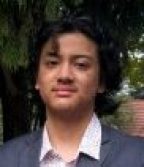The Summer Research Scholars (SRS) program provides support for students engaged in collaborative research under the guidance of W&L faculty. It is designed to foster the development of discipline-specific research skills, encourage active knowledge acquisition, and spark student interest in scholarly inquiry.
Below are the 2025 Computer Science SRS students, along with their faculty mentors and summaries of their research:
Professor Kefu Lu:
Professor Lu had two SRS students over the summer – Janeet Bajracharya ’26 and Slsabil Hassan ‘28

Janeet Bajracharya ’26

Slsabil Hassan ‘28
Research Synopsis:
The research topic for Professor Lu’s students was algorithm design in online scheduling. Online scheduling is the study of designing the best order for a machine to run programs (commonly referred to as jobs or tasks) in order to provide the best possible service. The online in the name refers to the fact that the algorithm does not have knowledge of which programs might arrive in the future and must adapt on the fly. Online scheduling is a well-studied topic, and it is a major area of algorithm design. Often, different algorithms are necessary depending on the goal of the schedule. Specifically, we studied a problem where the jobs that arrive to the machine can be parallelized and each have a deadline, with the goal of determining a schedule that maximizes the number of jobs completed before their deadlines elapse.
Professor Liz Matthews:
This summer, Professor Matthews mentored two SRS students—Sanjog Basnet ’27 and Trey Custodio ’26—who gathered data related to video game enjoyment.

Sanjog Basnet ‘27

Trey Custodio ‘26
Research Synopsis:
In academic research involving video game factors, such as enjoyment, frequently participants are divided into demographic groups based on their skill level, e.g. an “Expert Gamer” versus not. While these demographic distinctions are important, the metrics used for this distinction is not standardized across research and limits the demographic to a linear scale of perceived “skill”. Sanjog Basnet and Trey Custodio are working with Dr. Matthews to develop a new demographic metric to determine nonlinear gaming demographic categories to further improve other academic research. The process involves collecting a large amount of multi-variate data and then performing clustering algorithms on the responses.
Professor Sara Sprenkle:
Professor Sprenkle had 3 SRS students this summer — Elias Dakhoul, ’26, Teddy Ross ’26 and Micah Tongen’26

Elias Dakhoul, ’26
Elias’s project:
Elias’s research project investigates anomaly detection in web applications by user sessions to identify anomalous behavior based on behavioral features. Working with datasets from real-world applications, the project examines how various feature combinations impact the performance of unsupervised clustering algorithms. The sessions are characterized by 19 hand-engineered features, and two data combinations are employed: vectors (created by generating feature vectors per session) and unions (combinations of decisions from individual features). The key goals for this summer are to dive deeper into the literature and feature selection. The primary task is to compare a manual approach (selecting high-precision features) with an automated selection method. Preliminary results and subsequent analysis indicate that automating feature selection facilitates the identification of balanced combinations, which correctly identify anomalous behavior without excessive false positives.
“KMeans_Logic_Fall2010_divided_bots1”

SessionClassificationColorGraph”


Teddy Ross ’26
Teddy’s project:
This summer, Teddy investigated the use of metaheuristic algorithms—including genetic algorithms, hill climbing, and simulated annealing—to automatically generate test cases for web applications. His approach is designed to produce cost-effective test suites that achieve high coverage with minimal length. He further analyzed the effects of various genetic algorithm selection strategies, such as tournament and roulette wheel selection as well as probabilities for various mutation operators, on the effectiveness and efficiency of test suite generation. Experimental results on diverse web applications demonstrated that these evolutionary and heuristic techniques can successfully balance coverage and suite size, offering practical strategies for optimizing web application testing.

Micah Tongen’26
Micah’s project:
Micah wrote a script that creates a search system for ancient inscriptions by converting Latin and Greek texts into numerical representations capturing meaning. The system combines traditional keyword matching with this semantic understanding and uses a large language model to re-rank results, allowing researchers to discover conceptually connected ancient texts that would be missed by conventional search methods. Micah then wrote a paper explaining my results and submitted it to the Computational Humanities Research conference.
Congratulations to all the 2025 SRS students on their outstanding achievements!


















